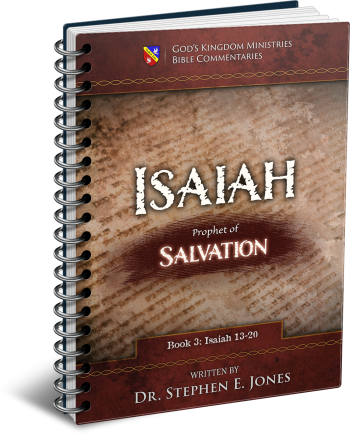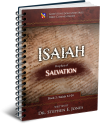Latest Posts
View the latest posts in an easy-to-read list format, with filtering options.

Isaiah is the prophet of Salvation. He is also known as the truly "Universalist" prophet, by which is meant that He makes it clear that salvation is extended equally to all nations and not just to Israel. He lived to see the fall of Israel and the deportation of the Israelites to Assyria, and he prophesied of their "return" to God (through repentance). He is truly a "major prophet" whose prophecies greatly influenced the Apostle Paul in the New Testament.
Category - Bible Commentaries

Isaiah described “the day of the Lord” in terms of the judgment upon nations—Babylon in particular—“to make the land a desolation.” He continues in Isaiah 13:10,
10 For the stars of heaven and their constellations will not flash forth their light; the sun will be dark when it rises and the moon will not shed its light.
It is difficult to know how literal we should interpret this ahead of time. Will such things happen literally as signs in the sun, moon, and stars? Will there be a heavy cloud cover—or perhaps smoke or dust—that will hide the heavenly bodies? An eclipse may hide the sun or the moon for a short period of time as well.
When Jesus was crucified, the sun was dark for about three hours (Matt. 27:45), and when He was being buried, the moon was eclipsed when it rose over Jerusalem at 5:10 pm. (See The Laws of the Second Coming, chapter 1.) Matthew, however, says nothing about the constellations and stars being darkened at that time.
Jesus quoted Isaiah 13:10, among other passages, in Matt. 24:29, 30, when He spoke of His second coming.
29 But immediately after the tribulation of those days the sun will be darkened, and the moon will not give its light, and the stars will fall from the sky, and the powers of the heavens will be shaken. 30 And then the sign of the Son of Man will appear in the sky, and then all the tribes of the earth will mourn, and they will see the Son of Man coming on the clouds of the sky with power and great glory.
In previous verses Jesus had talked about the destruction of Jerusalem and Judea as a whole (Matt. 24:16). He spoke of fleeing the city, saying in Matt. 24:20, “pray that your flight will not be in the winter or on a Sabbath.” The church in Jerusalem took heed to this when they saw the Roman armies approaching, and they fled to Pella during a lull in the war after Nero died in June of 68 A.D. Hence, they escaped the great destruction of the city in 70 A.D.
However, the city was rebuilt 50 years later, requiring another (greater) fulfillment of the prophecies. Jer. 19:10, 11 tell us that the city was to be destroyed in such a way that it would never again be rebuilt. That event is yet future, and since the city is still standing today, we know that the city still must see another “great tribulation.”
Jesus spoke of this destruction, saying in Matt. 24:21,
21 For then there will be a great tribulation, such as has not occurred since the beginning of the world until now, nor ever will.
Apparently, this will mark the final end of the long “seven times” of tribulation that began with Nebuchadnezzar. He captured the city in 604 B.C. and after the revolt of King Zedekiah, he destroyed the city in 586 B.C. We have written much about the “seven times” allotted to the various beast nations to rule, and how this ended in 1917 and again in 2017 (when we factor in the lost century from 163-63 B.C.). In 1917 General Allenby took Jerusalem from the Ottoman Empire; in 2017 the beast systems lost their right to rule the earth and are now falling.
However, it may be that another “seven times” cycle is playing out, dating from the destruction of Jerusalem in 586 B.C. We often see prophetic time cycles having more than one beginning point, each having a corresponding endpoint. If that is the case, then 2,520 years later (plus 100 years) from 586 B.C. comes to the year 2035.
This falls on the 121st Jubilee from Adam. Recall that the 120th Jubilee came in October 1986, and the Jubilee year itself was 1986-1987. (See Secrets of Time, chapter 2, for proof.) So it may be that the year 2035-2036 will see the final destruction of Jerusalem.
If that proves to be the case, we should not expect the coming of the Son of Man until “immediately after the tribulation of those days.” The signs in the heavens accompanying or preceding Christ’s return, as described by Isaiah and Jesus, would then be observed at that time. Isaiah says that the stars and constellations “will not flash forth their light.” Jesus interprets this, saying, “the stars will fall from the sky,” no doubt combining this prophecy with Isaiah 34:4,
4 And all the host of heaven will wear away [makak, “dwindle, decay, vanish”], and the sky will be rolled up like a scroll; all their host will also wither away [nabel, “fade”], as a leaf withers from the fig tree.
The metaphor is that the hosts of heaven—i.e., the stars—will “wear away” and “wither away.” It is not likely that the stars themselves will cease to exist. Isaiah’s metaphor indicates that their light dwindles and fades from men’s perspective. When Jesus says, “the stars will fall,” the Greek word is pipto, “to fall, or to fail.” The word can mean to fall down literally, but it is often used figuratively, such as a king’s “fall” from power. In other words, it could mean that the stars will lose their power to shine; hence, they are darkened.
Again, the sun, moon, and stars themselves could represent civil and religious authorities. The question is whether or not the world will see celestial signs in the heavens signaling the fall of these world powers, while the Kingdom of God arises to replace them with the overcomers.
As we will see later when we study Isaiah 34, the prophet links these events to “all the nations” (Isaiah 34:2) and specifically to Edom (Isaiah 34:5) in connection with the legal dispute about “Zion” (Isaiah 34:8). The New Testament gives more details about this dispute, but few know the history of Edom or its significance, and fewer recognize how the prophecy must be fulfilled.
Isaiah 13:11 says,
11 Thus I will punish [paqad, “visit, reckon, number”] the world for its evil, and the wicked for their iniquity; I will also put an end to the arrogance of the proud and abase the haughtiness of the ruthless.
The Hebrew word paqad, is rendered “punish” in the NASB, but the word is much broader than that. It means that God will come for a visit to reckon the numbers on a ledger. If the debt is higher than the assets, then a possible foreclosure can occur. By extension, then, paqad can mean divine judgment.
Personally, I do not like the word “punishment,” because it is a word that seems devoid of God’s love. God judges all things, not merely by the standard of His holiness, but more importantly, by the standard of His nature—love. Judgment is a better word, because this implies deliberation and discernment, which is seen in the reckoning of paqad. Ultimately, His judgment includes the restoration of the sinner.
Keep in mind that although Isaiah speaks of “the world,” the overall context is the oracle against Babylon. The word paqad is used a number of times by other prophets to convey the manner of God’s visitation upon Babylon. Psalm 106 is the climax of the fourth book of Psalms, called the Numbers Book. Psalm 106:4 says,
4 Remember me, O Lord, in Your favor toward Your people; visit [paqad] me with Your salvation [Yeshua].
The NASB found it impossible to translate paqad as “punishment” in this verse. I mean, “punish men with Your salvation” hardly makes sense. Those who have been wronged desire God’s visitation, for they know that they will not be judged but saved. When the accounts have been reckoned and the numbers have been “crunched,” they are confident that they will be set free from debt through Yeshua-Jesus.
So also, Jeremiah 27:22 says,
22 “They will be carried to Babylon, and they will be there until the day I visit [paqad] them,” declares the Lord. “Then I will bring them back and restore them to this place.”
The captives of Babylon were to be visited after 70 years. Having completed their time of bondage in Babylon, they were then to be restored. Conversely, Babylon would then be brought into judgment for its refusal to release the captives after 70 years (Jer. 50:33). Hence, God’s “visit” (paqad) can mean either justification or condemnation, according to the Judge’s verdict.
Inevitably, the evil rulers of Babylon are arrogant and haughty, and so they are condemned and brought low. The Babylonian kings thought that the Dominion Mandate was theirs forever and that they could rule Judah and the rest of the world with impunity. It is that arrogance that God judges, an arrogance that thinks it rules by its own power rather than by authority under God.
If the Babylonian kings had recognized the sovereignty of God (as Nebuchadnezzar himself came to see in Dan. 4:34, 35), they would have released the people of Judah after 70 years. Then they could have retained all the wealth and benefits that they had enjoyed from their captives.
But their arrogance was their downfall.
For this reason, the handwriting on the wall was seen in the royal palace (Dan. 5:5), and the message was that of bankruptcy proceedings. The nation had been numbered, and the accounts showed that their assets were “deficient” (Dan. 5:27). Hence, the nation was broken up and sold to the Medes and Persians.
So also is it today with Mystery Babylon. The same arrogance is evident, and they refuse to let the people go once again. The sentence has run its course, and their deadline to release their captives fell on the eighth day of Tabernacles, October 12, 2017.
Because the present world rulers of Babylon followed the pattern of arrogance as did their predecessors, God is now visiting His people, reckoning the accounts, and once again is finding Babylon to be bankrupt.